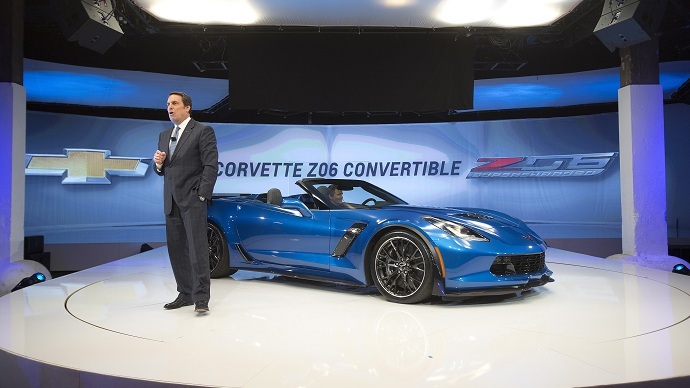General Motors is scrambling to prevent owners of the 2015 Chevrolet Corvette from breaking the law with the car’s high-tech recording device. Apparently, the company never got the memo that secret recordings are illegal in many states.
One of the new features of GM’s sports car is a part of the Performance Data Recorder called “Valet Mode.” The high-tech equipment allows ‘Vette owners to secretly record conversations in its interior ‒ as well as information about the car’s performance, even when they are not in the car.
“You can even capture video and data when someone else is driving the car with Valet Mode, giving you extra peace of mind,” the Chevrolet website states.

“Think of it as a baby monitor for your car,” Harlan Charles, Corvette product manager, said in a statement introducing the car. “Anyone who has felt apprehension about handing over their keys will appreciate the peace of mind of knowing exactly what happened while their baby was out of sight.”
If the technology had been around in the 1980s, Ferris Bueller never would have been able to have so much fun on his day off. And neither would the valets.

But GM apparently wasn’t paying attention to various wiretapping scandals over the years ‒ including Linda Tripp with Monica Lewinsky, the National Security Agency leaks or Donald Sterling. The company was seemingly oblivious to the fact that didn’t know that different states have different rules when it comes to recording conversations. And, in some places, using Valet Mode could be a felony.
“Federal wiretapping laws generally require only one party to consent to a recording of an interaction," Ars Technica reported. “But in California, Connecticut, Delaware, Florida, Hawaii, Illinois, Louisiana, Maryland, Massachusetts, Montana, Nevada, New Hampshire, Oregon, Pennsylvania, and Washington, all parties involved in the recording must either consent to a recording or at least be aware that the recording is happening, depending on the state. So if a Corvette owner turns on Valet Mode in California and turns the car over to the unknowing attendant, that Corvette owner could be committing a felony.”
Realizing its mistake, GM sent out letters to its dealers and mechanics last week, asking them to pass on the potential illegality of the feature to their customers. The letter also explained that the company would be coming out with an update to the 2015 Corvettes in the next month.
“In the meantime, you must advise any customers who take delivery of an impacted vehicle that they should refrain from using the Valet Mode until the update takes place,” the letter said, as posted on Corvette Forum. “If they do use the Valet Mode, they should (i) notify any occupants of the vehicle that they will be recorded while in the vehicle, and (ii) obtain their consent to this recording. It is very important that you explain this to each customer at the time of delivery.”
GM is “evaluating several scenarios for the software update – for example disabling the audio recording in Valet Mode, but keeping the video recording active,” Monte Doran, a spokesperson for Corvette, said to Forbes.
Ryan Calo of the University of Washington School of Law explained that the audio – not video – recording is the legal sticking point of the technology.
“It’s really the interior audio that triggers various wiretap laws,” Calo said. “But not if the owner warns, thereby defeating the expectation of privacy.”
Along with the recordings, Valet Mode also disables the entertainment system and locks storage compartments to deter thefts.
“Performance Data Recorder was initially designed as a tool for track days, allowing drivers to record their laps and improve their driving skills,” said Charles. “We soon realized the system could have many more applications, such as recording a scenic drive up Highway 101, or recording when the Valet Mode is activated.”

